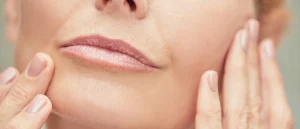
If you’ve had to master the art of concealing your lips, chances are you’re dealing with a darkening of the area known as hyperpigmentation of the lips. Some people develop lip pigmentation over time due to a variety of medical and lifestyle factors. The good news is that regardless of the root cause, this condition can be treated. We reached out to dermatologist and cosmetologist Dr. Doaa Nouraldeen to get her advice on treating this condition. Keep reading to learn more about her tips.
What is lip pigmentation?
Darkening of the lips over time is a common problem. Hyperpigmentation of the skin is a problem that people of color face very often and is caused by excessive melanin production. Similarly, pigmented lips are caused by many reasons – from sun exposure to using the wrong lip products to lack of moisture.
What causes black pigmentation on the lips?
Darkening of the lips can be the result of hyperpigmentation. This is a generally harmless condition caused by excess melanin. According to Dr. Doaa Nouraldeen, hyperpigmentation of the lips can be caused by:
- Excessive sun exposure
- Smoking
- Allergic reactions to lip stains and irritating foods.
Most of these causes can be treated with lifestyle changes. Dr. Doaa Nouraldeen indicates that lip pigmentation can persist depending on its cause.
The following can also cause darker lips:
- chemotherapy
- anemia
- vitamin deficiency
- excessive use of fluoride
- lack of hydration
- too much caffeine
- lip sucking
Dr. Doaa Nouraldeen adds that this condition can be caused by a wide range of diseases such as Addison’s disease, skin cancer, and genetic syndromes. Read on to find out how to lighten pigmented lips.
How to get rid of pigmentation on the lips?
1- Wait it out
In mild cases, pigmentation of the lips can be the result of an allergic reaction. If the hyperpigmentation is due to an allergic reaction to a food, a topical medication, or a cosmetic application, it usually disappears on its own within a few months.
2- Beware of exfoliation
We love baby-soft lips, but people with hyperpigmentation of the lips should be wary of abrasive scrubs. Too much exfoliation can cause trauma to the lips, called microabrasions.
3- Avoid licking your lips
If you have a habit of licking your lips, this may be the main cause of your hyperpigmentation. Often, patients who have a habit of licking their lips can develop hyperpigmentation due to inflammation of the skin. If this is your case, be careful with this habit.
4- Avoid smoking
Avoiding smoking will help prevent discoloration. If the hyperpigmentation on your lips is due to smoking, it is less likely to disappear if you continue to smoke.
5- Consider your hormones
Melasma and other hyperpigmentation can be caused by hormone-regulating medications such as birth control pills and pregnancy. Hyperpigmentation of the upper lip is sometimes part of what is called the “pregnancy mask” and can be extensive. Talk to your doctor about hormonal influences that may be contributing to pigmentation problems and how to remove pigmentation from upper lips.
6- Be gentle with your skin
If you’re dealing with hyperpigmentation of any kind, it is common to think that the more powerful chemicals you use, the better. While this may be true, it is important to engage in these techniques after consulting with a dermatologist. Sometimes, chemical peels can even paradoxically make pigmentation problems worse. It is important to seek help from a professional who knows how to manage potential side effects.
7- Know when to seek professional help
Treating melasma or other causes of upper lip hyperpigmentation is challenging, even in the hands of a professional. That said, it’s important to know when it’s time to seek professional help. If home remedies aren’t working, it’s time to consult a dermatologist to develop a customized skin care routine that’s tailored to your skin type and will safely treat your dark discoloration.
Moles on the lips can tend to look like pigmentation. If a mole or freckle appears on your lip, we recommend that you see a dermatologist for evaluation. Melanoma can also appear on the lip. Lip lesions should be evaluated as this is a high-risk area for sun damage and skin cancer.
8- Avoid waxing
Trauma to the skin around the lips can exacerbate lip darkening. This includes threading and waxing. Therefore, it’s best to space out your appointments or avoid them altogether to minimize the physical trauma to the area that stimulates pigmentation.
9- Wear protection
It may sound strange, but it turns out that sun exposure can also cause your lips to darken, just like your face and other parts of your body that are not covered by clothing.
In general, sunscreen is essential for skin health. Sunscreens that contain mineral blockers like zinc oxide can prevent melasma and other types of hyperpigmentation. Daily application of an SPF 30 mineral sunscreen is generally recommended, but for patients with melasma, SPF 50 or higher is preferable.
You should also apply sunscreen to your lips. Dr. Doaa Nouraldeen guarantees that wearing a lip balm with sun protection protects against further damage and reappearance of pigmentation after treatment.
10- Check your ingredient list
If you have specific skin care goals, it’s important to choose your product ingredients accordingly. Anti-pigmentation active ingredients should include hydroquinone, tranexamic acid, kojic acid, glycolic acid, and retinol to treat lip pigmentation.
11- Make an appointment for a laser treatment
If you’re looking for the fastest results, consider laser treatments that correct melanin overproduction rather than just topical treatments. The lip area responds very well to laser treatments that specifically target melanin pigment. This particular laser uses wavelengths of light to target melanin in the skin, dissolving it into smaller pieces. As the darker melanin is removed, the lips automatically lighten to their natural color.









